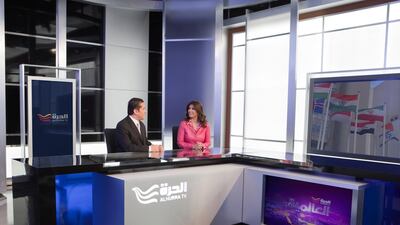The US-backed Al Hurra news station said on Tuesday it has taken immediate steps to “realign its field presence” in Iraq due to heightening tensions between Washington and Tehran.
Dozens of Iraqi journalists have faced threats and intimidation especially as they cover anti-government protests and the country's involvement in the proxy conflict.
Al Hurra, which means “The Free One” in Arabic, is part of the Middle East Broadcasting Networks (MBN), a non-profit corporation financed by the US government.
“MBN remains committed to reporting ‘the truth first’ and maintaining and strengthening the Al Hurra-Iraq television network, Sawa Radio-Iraq and MBN’s digital coverage of Iraq, upon which our audience has come to rely,” the network’s president ambassador Alberto Fernandez said in a statement.
The network said it will review its Baghdad field operations when the security situation improves and Iraqi journalists can “practice without fear and threats.”
It will be closing positions in Baghdad, while adding other positions throughout Iraq and in the region, the network said in a statement.
An Al Hurra spokesperson told The National that the network's operations will continue in Iraq, in terms of newsgathering and content coming out of the country.
But "as the threats became apparent and with the government unable to provide security to journalists, MBN was forced to take necessary measures unilaterally," Deirdre Kline, Director of Communications for Middle East Broadcasting Networks, said.
"It's known that some militia leaders such as Qais Al Khazali have issued documented threats against Al Hurra," Ms Kline said.
Iraq is currently ranked near the bottom of Reporters Without Borders’ (RSF) media freedom index.
It owes its current ranking of 156 out of 180 countries to routine attacks, arbitrary detentions and intimidation of journalists by militias and pro-government groups, according to RSF.
In September, Iraq’s Communications and Media Commission (CMC) suspended the license of Al Hurra for three months following a programme that investigated corruption among religious institutions.
Al Hurra stood by their report in a statement, calling it "fair, balanced, and professional. And that individuals and institutions mentioned in the report were given the right of reply, which they declined."
Lack of good governance has been central to Iraq’s problems.
Transparency International ranks Iraq 168 out of 180 countries on its Corruption Perception Index.


